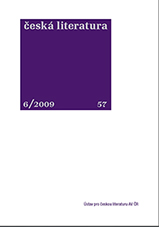Jak psát a nepsat dějiny české literatury
How and How Not to Write a History of Czech Literature
Author(s): Jiří HolýSubject(s): Literary Texts
Published by: AV ČR - Akademie věd České republiky - Ústav pro českou literaturu
Keywords: history of literature
Summary/Abstract: This article is concerned with several different concepts of literary history. It concludes that a multidisciplinary approach spanning a number of different media is now often used in synthetic histories of literature. It is no longer possible to write a history of literature in terms of a single, unified narrative or as a text governed by a single overarching idea. One must now use a multiplicity of approaches: literature as an autonomous evolutionary process, literature as part of cultural history, literature in the transnational context, and literature in the comparative context. The series of literary histories published by Harvard University Press (A New History of French Literature, A New History of German Literature, and A New Literary History of America) is particularly thought provoking in this respect since these works consider literature within a broad cultural and social context. The point of departure for each chapter is a literary or a social and/or political event. The History of the Literary Cultures of East-Central Europe, of which three volumes have been published so far (2004, 2006, and 2007) is unconventional and noteworthy. Czech literary history has, traditionally, struggled with national ideology and its prejudices. After the Communist takeover of 1948, this was superseded by Marxist ideology, which was similarly limiting. The article analyzes three recent histories of Czech literature, which have tried to overcome these boundaries. Dějiny české literatury (A History of Czech Literature) by Hana Voisine-Jechová was published in Czech in 2005 (and in French as Histoire de la littérature tchèque, in 2001). Although the author says she is using a comparative approach, her work contains a large number of mistakes, inaccuracies, and teleological and causal constructions. The third volume of Schamschula’s voluminous Geschichte der tschechischen Literatur (A History of Czech Literature, 2004) is much more successful. This work covers the period from 1918 to the present day. Schamschula manifests much greater literary-historical knowledge than Voisine-Jechová, but his approach is marred by an anti-Czech bias. What is more, Schamschula’s and Voisine-Jechová’s treatment of Czech literature after 1968 is quite inadequate. In many respects, these shortcomings have been rectified by the extensive, four volume project Dějiny české literatury 1945–1989 (A History of Czech Literature, 1945–89, vols I–II , 2007, vols II–IV, 2008), a collective work produced by the Prague based Institute of Czech Literature under Pavel Janoušek. This work uses a much broader definition of the concept of literature (taking into account, for example, the cultural context, the mass media, and rock and folk music). There are inaccuracies and problems even in this work, but on the whole this history has managed to overcome the teleological concept and some of the traditional constraints of Czech literary history.
Journal: Česká literatura
- Issue Year: 57/2009
- Issue No: 6
- Page Range: 775-801
- Page Count: 26
- Language: Czech

